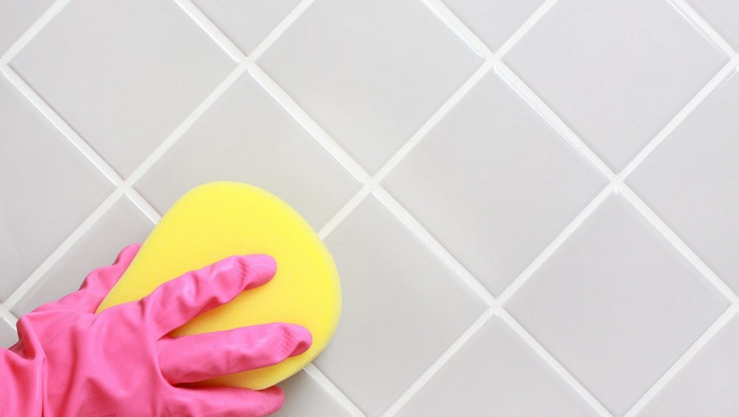
You know those gloomy weekend days when you just can’t stand the thought of heading outdoors and and Netflix has nothing new to offer? Have we got a job for you!
Take a look at the grout in your tile floors. Rather gross, right? Unless you suffer from ablutomania (we’ll wait while you go look it up), those spaces have seen better days.
So, take advantage of the downtime and get a head start on spring cleaning with these handy tips.
1. Clean it
Surf the internet for “how to clean dirty grout” and you’ll find enough different ways to keep you busy for the rest of the winter. So, we tried some of them on a grungy entryway tile floor:
- Toothpaste
- Nail polish remover
- Barkeepers’ Friend (a cleanser)
- Bleach
- Vinegar
- Soft Scrub
- Magic Eraser
- Vinegar and baking soda
- Hydrogen peroxide and baking soda
- A slurry of baking soda and water
The latter, allowed to sit for about five minutes and then scrubbed with a toothbrush was by far the most effective method. Try an old electric toothbrush if you want to use less muscle-power.
One method we didn’t try is that recommended by Tim Carter, owner of the website askthebuilder.com, in his column at the Washington Post.
He uses oxygen bleach powder, which he claims is “nontoxic, doesn’t produce harsh fumes, and is color- and fabric-safe.”
Soak the grout lines with solution of the bleach and warm water (no, he doesn’t give the quantity of bleach to water) and allow it to remain for 15 minutes. During this time, “the oxygen ions attack the stain molecules, breaking them into pieces that rinse away with little effort,” claims Carter.
As it’s absorbed into the grout, add more so that the lines are always flooded with the solution. Then, scrub the grout, adding additional solution as you scrub.
He also suggests adding oxygen bleach powder to your mopping water each time your mop the floor.
2. Hide it
If the sealant is old or wearing off you may lose some of the grout’s color when using abrasive cleaners – we even lost a bit with the baking soda/water slurry. And, you may end up with lingering stains, as did Sherry Petersik at Young House Love.
If so, it’s time to “cheat.” Or, skip the scrubbing all together and head straight for this solution.
Petersik used a product called Polyblend Grout Renew that she picked up at Home Depot. The manufacturer describes it as a “colorant” and, applied with a small paintbrush or toothbrush, its recommended use is to “restore or change grout color of cement grout joints.”
We shopped around for you and, although it comes in a wide variety of colors at Amazon.com, it’s less expensive at Home Depot.
We have seen similar products, in different forms. One comes in a marking pen-like form and in 33 different colors, and another in a hair color applicator-like bottle.
You’ll need to seal the grout after cleaning or coloring and there are a number of products at Amazon.com that, judging by customer reviews, seem to do the trick.
3. Start anew
Although it sounds a bit challenging for the novice DIYer, you can find instructions on how to remove and replace grout, online.
Just the list of equipment required to do the job, however, has us scanning the internet to find a pro to do the job.
- A rotary tool with diamond blades
- A large grout sponge
- Scrub brush
- Bucket
- Rubber float
- Dust mask
- Shop vac
- Safety glasses
- Ear protection
- Carbide hand tool and blades
- Gloves
- Bleach
- Pre-Mixed grout
- Sealer
Supplies and equipment for a 129 square-foot grout replacement job will run you from $220 to about $265, according to homewyse.com. Add in whatever you figure your time is worth because the job will take nearly 34 hours.
Then, you’ll need to wait a few days for the new grout to dry (keeping kids and pets off of it — easy peasy, right?). before applying the sealant.
To have a pro do the work for you, plan on spending between $253 and $574, according to homeadvisor.com.